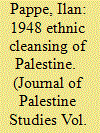| Srl | Item |
| 1 |
ID:
075262


|
|
|
|
|
| Publication |
2006.
|
| Summary/Abstract |
This article, excerpted and adapted from the early chapters of a new book, emphasizes the systematic preparations that laid the ground for the expulsion of more than 750,000 Palestinians from what became Israel in 1948. While sketching the context and diplomatic and political developments of the period, the article highlights in particular a multi-year "Village Files" project (1940-47) involving the systematic compilation of maps and intelligence for each Arab village and the elaboration-under the direction of an inner "caucus" of fewer than a dozen men led by David Ben-Gurion-of a series of military plans culminating in Plan Dalet, according to which the 1948 war was fought. The article ends with a statement of one of the author's underlying goals in writing the book: to make the case for a paradigm of ethnic cleansing to replace the paradigm of war as the basis for the scholarly research of, and the public debate about, 1948.
|
|
|
|
|
|
|
|
|
|
|
|
|
|
|
|
| 2 |
ID:
075264


|
|
|
| 3 |
ID:
075263


|
|
|
|
|
| Publication |
2006.
|
| Summary/Abstract |
The second intifada and the U.S. "global war on terror," though quite different, both involve asymmetrical warfare that pits powerful states against non-state organizations. This article focuses on international humanitarian law (IHL) to assess and compare how Israeli and American doctrines and policies for waging "wars on terror" have departed from international consensus on norms and rules for military engagement in occupied territories and the treatment of enemy prisoners. Neither Israel nor the United States ignores IHL; rather, they seek to reinterpret it in a manner that permits the pursuit (militarized or otherwise) of political agendas, even while claiming the reinterpretation to be legally valid.
|
|
|
|
|
|
|
|
|
|
|
|
|
|
|
|
| 4 |
ID:
075265


|
|
|
|
|
| Publication |
2006.
|
| Summary/Abstract |
This is the third and final installment of Um Jabr's "life story," earlier segments of which-on village life in pre-1948 Palestine and on the 1948 war and its aftermath-were published in JPS 138 (winter 2006) and JPS 140 (summer 2006). The current excerpts focus on Um Jabr's intense involvement in the prisoner issue that began when two of her sons were in Israeli jails. In particular, her activism took the form of organizing other women to visit prisoners from Arab countries who had no one to visit them on the twice monthly visits allowed. Um Jabr's 36,000-word "life story" was one of seven collected as part of an oral history project, as yet unpublished, carried out by Barbara Bill, an Australian who since 1996 has worked with the Women's Empowerment Project of the Gaza Community Mental Health Program, and Ghada Ageel, a refugee from al-Bureij camp now earning her Ph.D. at the University of Exeter in England. The women who participated in the project were interviewed a number of times during the first half of 2001; after the tapes were transcribed, the memories were set down exactly as they were told, the only "editing" being the integration of material from the various interviews into one "life story." Um Jabr, who was in her early 70s at the time of the interviews, still lives in al-Bureij camp, where she has since 1950.
|
|
|
|
|
|
|
|
|
|
|
|
|
|
|
|